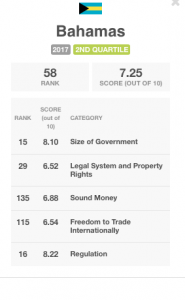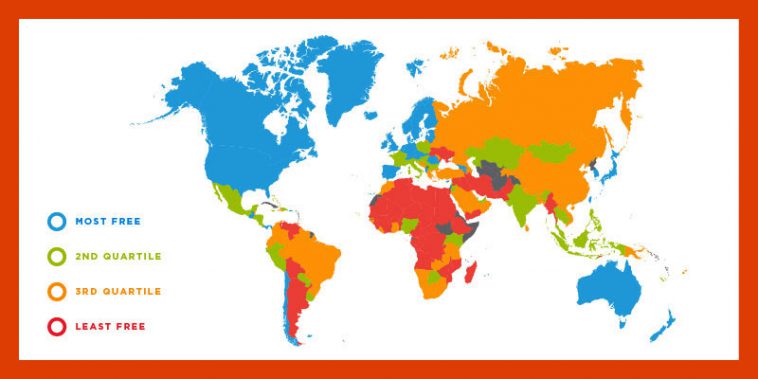 September 12, 2019
September 12, 2019
Nassau, New Providence—The Bahamas ranks 58 out of 162 countries and territories included in the Economic Freedom of the World: 2019 Annual Report, released today by The Nassau Institute in conjunction with Canada’s Fraser Institute.
Last year, The Bahamas ranked 51.
The Bahamas overall ratings dropped from 7.36 to 7.25. The most significant categories where declines occurred was the Size of Government, and the Legal System and Property Rights. (see below)
Hong Kong and Singapore again top the index, continue their streak as 1st and 2nd respectively. New Zealand, Switzerland, United States, Ireland, United Kingdom, Canada, Australia, and Mauritius round out the top 10.
The report was prepared by James Gwartney, Florida State University; Robert A. Lawson and Ryan Murphy of Southern Methodist University; and Joshua Hall, West Virginia University.
It’s based on data from 2017 (the most recent year of available comparable data) and measures the economic freedom (levels of personal choice, ability to enter markets, security of privately owned property, rule of law, etc.) by analysing the policies and institutions of 162 countries and territories.
The 10 lowest-rated countries are: Iraq, Republic of Congo, Egypt, Syria, Democratic Republic of Congo, Angola, Algeria, Sudan, Libya, and lastly Venezuela. Some despotic countries such as North Korea and Cuba can’t be ranked due to lack of data.
The rankings of some other major countries are Japan (17th), Germany (20th), Italy (46th), France (50th), Mexico (76th), India (79th), Russia (85th), China (113th), and Brazil (120th).
According to research in top peer-reviewed academic journals, people living in countries with high levels of economic freedom enjoy greater prosperity, more political and civil liberties, and longer lives.
For example, in the top quartile of economic freedom had an average per-capita GDP of $36,770$40,376 in 2017, compared to $6,140$5,649 for bottom quartile nations (PPP constant 20117 US$). And poverty is much reduced. In the top quartile, 1.8 percent of the population experience extreme poverty (US$1.90 a day) compared to 27.2 percent in the lowest quintile.
Life expectancy is 79.5 years in the top quartile of countries compared to 64.4 years in the bottom quartile.
“Where people are free to pursue their own opportunities and make their own choices, they lead more prosperous, happier and healthier lives,” said Fred McMahon, Dr. Michael A. Walker Research Chair in Economic Freedom with the Fraser Institute.
Hong Kong’s rank may surprise some, though the index is based on data from 2017. “Intrusion on the rule of law by the Beijing government has negatively affected economic freedom in Hong Kong. While it remains first overall, Hong Kong has been declining since 2009 in the rule of law, the foundation of economic freedom. The current situation is even more cause for concern about whether future residents of Hong Kong will continue to enjoy the highest level of economically freedom on the planet,” McMahon said.
The Fraser Institute produces the annual Economic Freedom of the World report in cooperation with the Economic Freedom Network, a group of independent research and educational institutes in nearly 100 countries and territories. It’s the world’s premier measurement of economic freedom, measuring and ranking countries in five areas: size of government, legal structure and security of property rights, access to sound money, freedom to trade internationally and regulation of credit, labour and business.
See the full report at www.fraserinstitute.org/economic-freedom.
The Bahamas scores in key components of economic freedom (from 1 to 10 where a higher value indicates a higher level of economic freedom):
- Size of government: changed to 7.25 from 7.36 in the last year’s report
- Legal system and property rights: changed to 8.10 from 8.29
- Access to sound money: changed to 6.88 from 6.78
- Freedom to trade internationally: changed to 6.54 from 6.71
- Regulation of credit, labour and business: changed to 8.22 from 8.17
About the Economic Freedom Index
Economic Freedom of the World measures the degree to which the policies and institutions of countries support economic freedom. This year’s publication ranks 162 countries and territories. The report also updates data in earlier reports in instances where data has been revised.
For more information on the Economic Freedom Network, datasets, and previous Economic Freedom of the World reports, visit www.fraserinstitute.org. And you can ‘Like’ the Economic Freedom Network on Facebook at www.facebook.com/EconomicFreedomNetwork.
-30-
CONTACTS:
info@nassauinstitute.org
For more information on the Economic Freedom Network, datasets, and previous Economic Freedom of the World reports, go to www.fraserinstitute.org/economic-freedom.
The Nassau Institute is an independent, a-political, non-profit institute that promotes economic growth in a free market economy with limited government, in a society that embraces the rule of law and the right to private property. www.nassauinstitute.org



Comments 2
How disappointing.. For a small, hole in the wall, country, we should do better far than this.. The ranking trend over the past four years for the Freedom Index has been on a continuous decline.. This is not acceptable and government must address this declining trend.. A free people are a strong and resilient people.. Freedom is the backbone of a strong and dynamic nation.. Freedom is our most important objective and goal and the key to our future economic development and growth..
Author
When we consider back in the mid 1970’s we ranked 14th, we’ve fallen a long way.